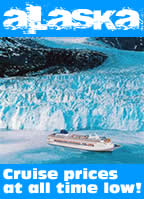President of the National Fisheries Institute, says the seafood industry needs to support the House version of update to Magnuson-Stevens Act
7/14/06Bangor, Maine
John Connelly, president of the National Fisheries Institute, wrote a letter to the editor of the Bangor Daily News refuting what he called "doom and gloom" stories about the pending demise of fisheries.
"Seafood isn't just a source of healthy and delicious protein in Bangor
and across the state of Maine - it's a part of the local livelihood. And I
can tell you as a leader in this industry that  contrary to the "doom and
gloom"; out there about the status of U.S. commercial fisheries, the vast
majority of them are operating sustainably. And with support for an
important bill in Congress, we can ensure a reliable supply of seafood for
Americans now and into the future."
contrary to the "doom and
gloom"; out there about the status of U.S. commercial fisheries, the vast
majority of them are operating sustainably. And with support for an
important bill in Congress, we can ensure a reliable supply of seafood for
Americans now and into the future."
"According to the National Oceanic and Atmospheric Administration's (NOAA) 'Status of Fisheries of the United States'; report, 81 percent of fish stocks assessed for 2005 are well managed and one stock in the Pacific Northwest, lingcod, has been fully rebuilt three years ahead of schedule."
"The bottom line is: if the species of fish is in the store or on the menu, the stock is available to meet consumer demand. And that demand for fish in this country is at an all-time high - each American consumed nearly 17 pounds of seafood in 2004 - and a big reason for that is fish is a low-fat, low-calorie source of protein and heart-healthy omega-3 fatty acids."
"In fact, in its dietary guidelines, the federal government advises Americans to consume more fish to live 'longer, healthier and more active lives.' And the evidence that fish is heart-healthy is echoed by the American Heart Association (AHA), which recommends eating fish at least twice a week and that 'healthy people should eat omega-3 fatty acids from fish to protect their hearts.'"
"As consumers eat more fish for the tremendous health benefits it offers, we need a reliable supply to fulfill that demand. The Magnuson-Stevens Act (MSA), the law that governs how fish supplies are managed, is currently before Congress and needs our support. The House of Representatives will soon vote on a bill designed to revise MSA and ensure fish stocks in U.S. waters are managed well now and into the future. The legislation balances the need to conserve fish stocks and habitat and the need to feed American families. It also directly affects the livelihoods and culture of tens of thousands of fishermen and the communities that depend on their economic support."
"But in Washington, D.C., it's not very common to see work getting done with agreement from both Democrats and Republicans. That's why the bill to improve the Magnuson-Stevens Act is exceptional. H.R. 5018, the American Fisheries Management and Marine Life Enhancement Act, is sponsored by conservative California Republican Richard Pombo and liberal Massachusetts Democrat Barney Frank. This unlikely duo has developed a bill to strengthen conservation and the role of science in regional fisheries decision-making and protect our ability to provide a healthy product to today's consumers."
"Under the MSA, our country's fishing areas are managed by a system of eight regional councils, each consisting of conservationists, fishing industry experts, government officials, scientists, and community representatives. But some in our nation's capital would like to see that power removed from local control and replace it with a large, centralized bureaucracy. That just doesn't work. The councils are designed so that individuals most familiar with local waters can make the best decisions for their region."
"The bipartisan Pombo-Frank bill strengthens local control, builds on current best practices and improves the role that science plays in conserving fish and marine ecosystems. By making available the latest science and statistics, local management decisions can be made in real time, ensuring fishermen limit harvests and leave enough fish in the water so that they are able to replenish for generations to come."
"And there's proof this system works: the principles in H.R. 5018 are based on a fisheries management model in Alaska, where more than half of our nation's fish are caught. Alaska pollock, the country's largest fishery, has been healthy for decades and is certified by an international environmental organization, the Marine Stewardship Council (MSC). That's because Alaska's fishermen listen to advice from conservation scientists and take measures to protect marine animals and habitats."
"Congress now has a chance to follow the lead of two politicians with different world views who reached across the political divide to strengthen American fisheries policy. The Pombo-Frank MSA bill will help ensure the health of our seafood supply, the environment, the economy of fishing communities across the nation, and Americans' diets."


